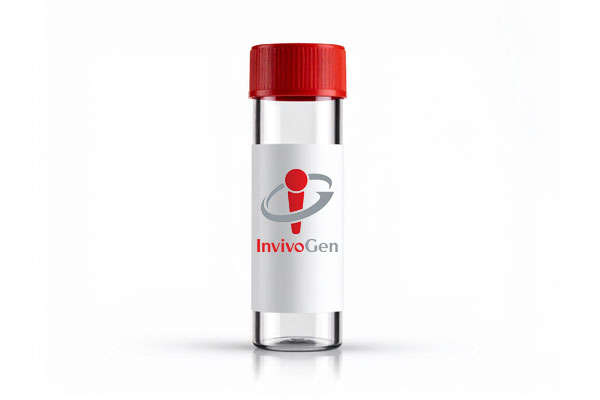HEK-Blue™ GM-CSF Cells
-
Cat.code:
hkb-hgmcsfr
- Documents
ABOUT
GM-CSF responsive STAT5-SEAP reporter assay
HEK-Blue™ GM-CSF cells are designed to monitor human GM-CSF-induced STAT5 stimulation or inhibition through SEAP detection. This colorimetric bioassay can be used for screening activatory molecules, such as engineered cytokines, or inhibitory molecules, such as neutralizing antibodies.
HEK-Blue™ GM-CSF cells respond specifically to recombinant human GM-CSF. The reliable and consistent performance of HEK-Blue™ GM-CSF cells makes them suitable for release assays of therapeutic molecules that inhibit GM-CSF signaling, such as Mavrilimumab , a monoclonal antibody targeting the α chain of GM-CSF receptor (see figures).
Key features
- Readily assessable STAT5-SEAP reporter activity
- Convenient readout using QUANTI-Blue™ Solution
- High sensitivity to human (h) GM-CSF activity
- Stability guaranteed for 20 passages
Applications
- Therapeutic development
- Drug screening
- Release assay
Granulocyte-macrophage colony-stimulating factor (GM-CSF, aka CSF2), although originally identified as a hematopoietic growth factor, is now regarded as a pleiotropic regulator of inflammation in the responses to pathogens, autoimmune diseases, and cancer [1, 2].
Disclaimer: These cells are for internal research use only and are covered by a Limited Use License (See Terms and Conditions). Additional rights may be available.
SPECIFICATIONS
Specifications
Detection and quantification of GM-CSF activity
Human GM-CSF: 5 pg/ml - 100 ng/ml
Complete DMEM (see TDS)
Verified using Plasmotest™
Each lot is functionally tested and validated.
CONTENTS
Contents
-
Product:HEK-Blue™ GM-CSF Cells
-
Cat code:hkb-hgmcsfr
-
Quantity:3-7 x 10^6 cells
- 2 x 1 ml HEK-Blue Selection (250X concentrate)
- 1 ml Normocin® (50 mg/ml)
- 1 ml of QB reagent and 1 ml of QB buffer (sufficient to prepare 100 ml of QUANTI-Blue™ Solution, a SEAP detection reagent)
Shipping & Storage
- Shipping method: Dry ice
- Liquid nitrogen vapor
- Upon receipt, store immediately in liquid nitrogen vapor. Do not store cell vials at -80°C.
Storage:
Caution:
Details
Cell line description
HEK-Blue™ GM-CSF cells were generated by stable transfection with the genes encoding for human GMRα (CD116), GMRβ (CD131), STAT5, as well as a STAT5-inducible secreted embryonic alkaline phosphatase (SEAP) reporter. The binding of GM-CSF to its receptor triggers a signaling cascade leading to the activation of STAT5 and the subsequent production of SEAP. This can be readily assessed in the supernatant using QUANTI-Blue™ Solution, a SEAP detection reagent.
HEK-Blue™ GM-CSF cells strongly respond to human, but not mouse, GM-CSF. Of note, these cells are not responsive to human IL-6, IL-27, and type I IFN (see figures).
GM-CSF background
The granulocyte-macrophage colony-stimulating factor (GM-CSF, aka CSF2) belongs to the β-common chain cytokine family [1]. Although originally identified as a hematopoietic growth factor, this cytokine is now regarded as a pleiotropic regulator of inflammation in the responses to pathogens, autoimmune diseases, and cancer [1, 2]. GM-CSF signalization requires a multimeric structure comprising four α chains (GMRα, aka CD116), four β chains (GMRβ aka CD131), and four cytokines. This 12-protein complex allows the juxtaposition of the intracellular Janus kinase 2 (JAK2) and activation of the signal transducer and activator of transcription 5 (STAT5) [1]. Other signaling pathways include ERK, NF-κB, and AKT pathways [2, 3].
The understanding of cellular and molecular mechanisms whereby GM-CSF exerts its varied functions is key for the development of therapeutic strategies (e.g. cancer vaccines, blocking antibodies) [1].
1. Dougan M. et al., 2019. GM-CSF, IL-3, and IL-5 family of cytokines: regulators of inflammation. Immunity. 50(4):796-811.
2. Zhan Y. et al., 2019. The Pleiotropic Effects of the GM-CSF Rheostat on Myeloid Cell Differentiation and Function: More Than a Numbers Game. Front Immunol. 102679.
3. Hamilton J.A., 2020. GM-CSF in inflammation. J. Exp . Med. 217(1):e20190945.
DOCUMENTS
Documents
Technical Data Sheet
Validation Data Sheet
Safety Data Sheet
Certificate of analysis
Need a CoA ?













